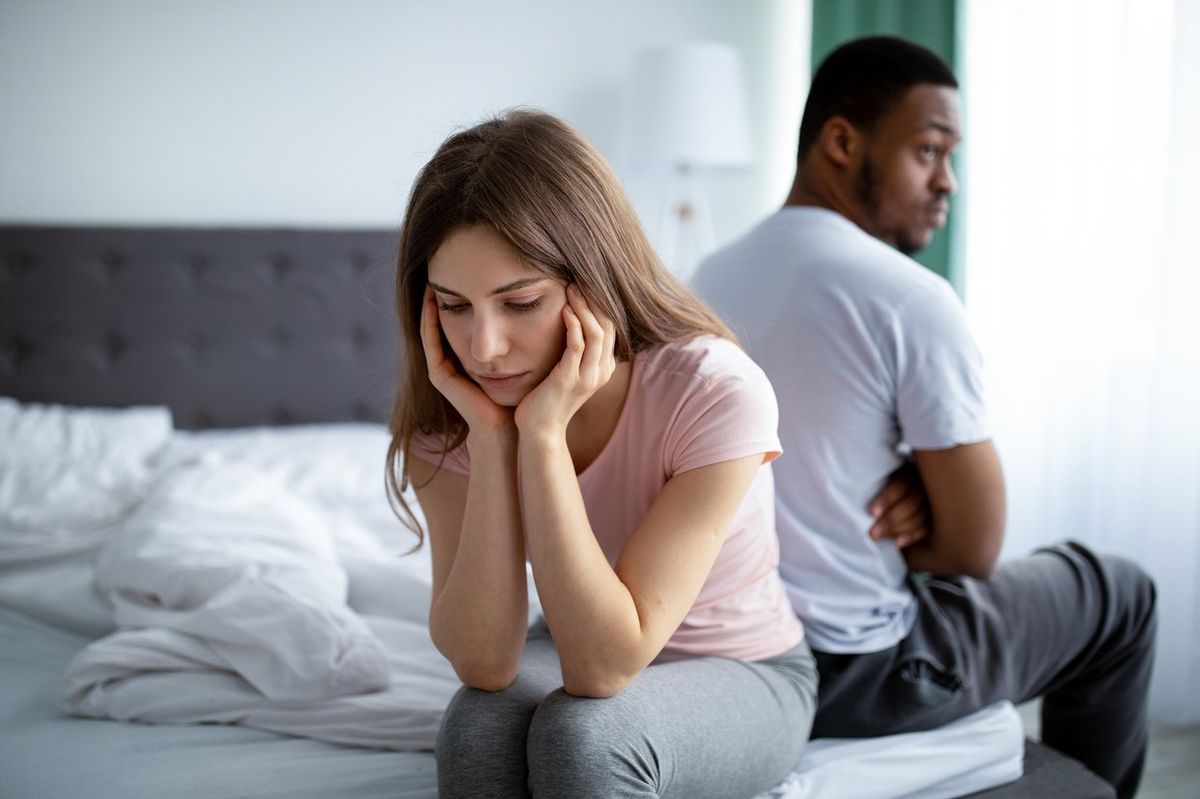Living with severe endometriosis made it hard for Annabelle Baugh, who uses they/them pronouns, to feel pleasure during sex. Afterward, they were nauseous, bloated, tired and in pain.
It wasn’t until Baugh turned 43 that they learned they were at high risk for ovarian cancer. After getting a hysterectomy and hormone replacement therapy (HRT), they experienced their first orgasm and now lead a healthy and active sex life.
It’s not normal for people to experience pain during sexual intercourse or penetration. Yet, about 3 out of 4 people assigned female at birth report experiencing painful sex, called dyspareunia. Experiencing pain during sex is not only uncomfortable, but affects your pleasure.
For people with female anatomy, painful sex may indicate an underlying condition that needs to be addressed, but you don’t have to put up with painful sex. Treatment and open communication with your partner can lead to better experiences.
Read: Q&A: A Patient’s Perspective on Experiencing Uterine Health Conditions >>
Here’s a look at chronic uterine conditions and how they can influence your sex life.
What are chronic uterine conditions?
Chronic uterine conditions, also called uterine diseases, are any conditions that affect your uterus. And they can be caused by hormonal imbalances, thyroid problems, polyps, cancer, infection or pregnancy.
“There are multiple uterine conditions that impact women,” said Barb DePree, M.D., MSCP, an OB-GYN and a member of HealthyWomen’s Women’s Health Advisory Council. She mentioned that the more common uterine conditions include endometriosis, uterine fibroids, adenomyosis, pelvic organ prolapse and pelvic inflammatory disease.
These conditions can be treated with birth control pills, GnRH antagonists, pain medicine or — in some cases — surgery.
Chronic uterine conditions can impact your life
A common complaint that people with chronic uterine conditions have is persistent pelvic pain that lasts six months or more.
Symptoms of chronic pelvic pain include:
- Severe and steady pain
- Pain that comes and goes
- Dull aches
- Sharp pains or cramps
- Pressure or heaviness in the pelvis
This pain can happen during sexual intercourse or penetration, when you pee or poop, or when you stand for extended periods of time.
Read: 11 Things That Heaviness in Your Pelvic Area Might Mean >>
How do chronic uterine conditions affect your sex life?
Experiencing pain during sex can keep you from experiencing sexual pleasure. And that, in turn, can also contribute to having a low sex drive. The burden of dealing with the physical symptoms of uterine conditions can also cause mental health issues like depression and fatigue, which also can impact your desire to have sex.
According to DePree, how you view your condition also plays a big role in how you approach sex. “Some women don’t allow that to interfere in their enjoyment of intimacy, and [for] other women, it might be a distraction or difficulty for them,” she said.
How can partners work through potential pain and bleeding?
You shouldn’t have to navigate painful sex or bleeding without the help of your partner. Communication is important to having great sexual experiences if you’re managing a chronic uterine condition.
DePree recommended expressing your sexual desires before or during sex. “[You can do this by] not relying on your partner reading your mind to determine what’s working and what’s not working, but talking them through that,” she explained.
It’s completely understandable if the thought of starting this conversation makes you uncomfortable, and that’s OK. It can be nerve-racking to discuss the discomfort you experience during sex and you may not want your partner to think they’re causing you pain.
When talking to your partner, you can bring up your healthcare provider appointment to ease your nerves and start the conversation. DePree said she tells her patients to use their appointments to express their concerns about painful intercourse. “Sometimes it’s easier to make it a third party that’s suggesting you have that conversation,” DePree said.
There are also a few things you and your partner can try to help manage pain during sex:
- Try different ways to be intimate: Explore ways of being intimate that don’t include penetration, get creative with touching and experiment to see if different positions are less painful.
- Use lubricant: You can use over-the-counter lubricant to ease pain and increase sexual comfort by reducing friction during any type of penetration. Lubricants come in gel and liquid form.
- Try bumpers: Prevent deep penetration with penis bumpers. Bumpers allow the penetrating partner to thrust without the receiving partner perceiving or experiencing the thrusting to be as deep.
How to handle bleeding during sex
It’s important to note that uterine conditions can cause not only pain during sex but also bleeding.
Abnormal uterine bleeding can last for several days, and that can affect your desire or pleasure during sexual activity. Unfortunately, because of the stigma surrounding vaginal bleeding, the sight of blood may be off-putting or cause concerns for you or your partner.
But the good news is that discussing your condition and symptoms can better prepare your partner if or when bleeding occurs so it won’t negatively affect your sexual experiences.
DePree noted that sex is just one part of a relationship, so it’s important to have healthy conversations about physical intimacy. “Good communication around sex spills over into being a better communicator about many other things,” added DePree.
The physical and mental effects of living with a chronic uterine condition can have a chilling effect on your sex life. But, fortunately, treatment and solid communication between partners can help heat things back up.
This educational resource was created with support from Sumitomo Pharma, a HealthyWomen Corporate Advisory Council member.
From Your Site Articles
Related Articles Around the Web







